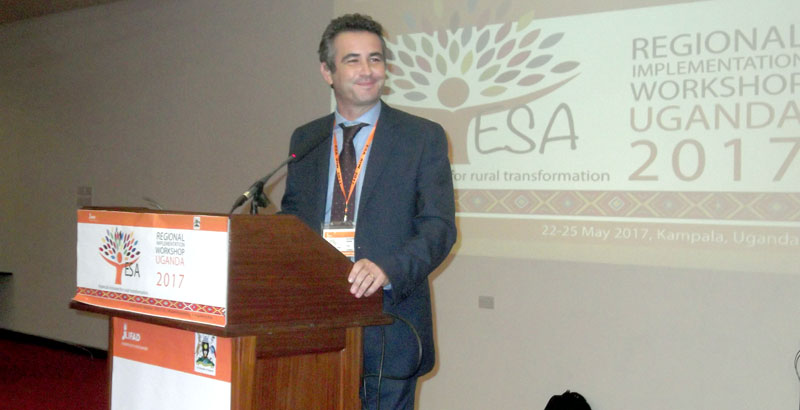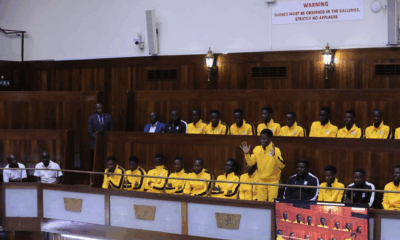News
Uganda hosts IFAD rural-change conference
The rural implementation workshop (RIW), the first of its kind to be held in Uganda, opened at the Munyonyo Resort Hotel this week, hosted by the International Fund for Agricultural Development (IFAD). The four-day assembly brought together 16 East and Southern African (ESA) countries.
This is a follow-up of a similar meeting which was held in Madagascar in 2015. The Munyonyo meet was convened to discuss, “Financial Inclusion in Rural Areas”, a theme, according to the Uganda IFAD Country Director, Allessandro Marini, was aimed at the participating delegations to “share and learn from each other’s experiences”.
He added: “We want farmers to become businessmen. Agriculture is not only about farming, but also a business activity.” In line with this, 28 farmers’ groups were also present as a discerning action in the private-public partnership cross-cutting factor for rural transformation.
The Minister of State for Finance and Economic Planning in-charge of Micro-finance, Haruna Kasolo Kyeyune, highlighted the goals that IFAD has to get to grips with in fostering the rural areas for the agro-based people to achieve economic transformation. These include: Uganda’s high population growth rate, among the highest in the world, put at 3.3%; pressure on land with limits on commercial farming; soil degradation; unfavourable market conditions for the small-holder farmers; and, crucially, financial unavailability.
On this last point, Kasolo said that it was a big challenge for the ESA countries with an agrarian population of 73%, which rural people are for now, mere spectators. “You cannot delegate someone to be rich on your behalf,” he lamented. “For people to grow rich, they need to save.”
He said that IFAD should look into providing the means to the 86% of the un-banked Uganda’s population. That would come with the information and provision for the availability of cheap and affordable credit to the small-holder agricultural farmers.
In answer, the IFAD Regional Director for ESA, Sana Jatta, said the IFAD strategy adopted in Madagascar in 2015, is to decentralize and dialogue at the country level. This had borne the result of the formation of Uganda’s innovative Programme for Financial Inclusion in Rural Areas – PROFIRA. He also cited the Vegetable Oil Development Project (VODP) in the 80 Kalangala islands in Masaka that had become a “flagship for rural transformation”.
On cue, the Minister of Agriculture, Animal Industries and Fisheries, Vincent Ssempijja, said that as a result of the IFAD’s participation in Uganda’s development process, 16 projects had been implemented in which the fund had put in 385 million dollars out of a total of $1.4b.
He said that a big part of this is financial inclusion which is a key driver to rural development; and in Uganda this has been reflected in the deliberate steps stipulated in the Vision 2040 in the National Development Plan.
Ssempijja said that steps taken by the Bank of Uganda and the promulgation of the Financial Inclusion Act had led to the emergence of the mobile money market phenomenon which had got the people’s participation from 35% in 2006, to 85%, last year.
Now, the mobile money statistics indicate that in 2008, only 10,010 people were using the mobile money facility whereas, by last year, the number had ballooned to 20.1 million people. Among other things, he added that it had led to the poverty reduction figure to fall from 56% in 1993 to 19.7% in 2013. Yet poverty was still widespread, with a third of the people, getting less than $1.9 dollars a day.
According to the minister, Vision 2040 had led to instituting the National Agricultural Plan aimed at achieving the household incomes for both food security and nutritional value. It will also provide for incomes to be achieved from sustained agricultural activity for value addition and trade, a key source of employment.
Still, Ssempijja, entreated IFAD to help strengthen agriculture, especially in bolstering the National Policy Framework of 2016-2020 which is geared towards in the adoption of the National Development Plans 1 and 11. The challenges involved in this are for IFAD to seek different approaches to for the involvement of the women and youth to be guiding factors in the relevant projects.
He said that other issues involved coming to grips with the effects of climate change; tackling agriculturally-inspired technology; and, getting the small-holder agricultural schemes to provide a build-up for the IFAD activities in the country.
ESA countries which participated in the Munyonyo meet
As Uganda’s IFAD Country Director, Allessandro Marini, noted, the four-day conference was conducive to perceptions from the more than 320 delegated from 16 East and South African (ESA) region. These were enhanced by the presence of the staff-delegates from the IFAD headquarters based in Rome, Italy.
This well-attended Regional Implementation Workshop (RIW) drew delegations from: Angola, Botswana, Burundi, Ethiopia, Kenya, Rwanda, Lesotho, Madagascar, Malawi and Mozambique.
Other delegated were from: Seychelles, Swaziland, Tanzania, Zambia, Zimbabwe and Uganda, the host country.
Comments



















